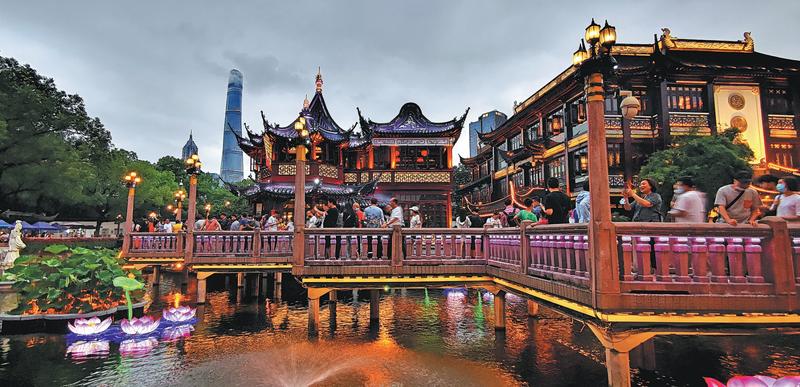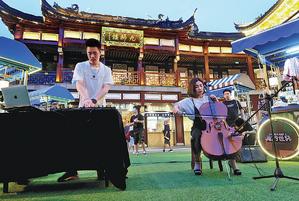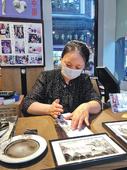The famous Yu Garden is using pop-up stores and live performances to draw younger visitors, Xing Yi reports in Shanghai.
 A summer festival including pop-up markets and cultural performances has imbued Shanghai's historical Yu Garden with a modern twist. (XING YI / CHINA DAILY)
A summer festival including pop-up markets and cultural performances has imbued Shanghai's historical Yu Garden with a modern twist. (XING YI / CHINA DAILY)
With a history spanning more than 400 years, Yu Garden has always been a popular international destination in Shanghai.
But many Shanghai residents, especially those from the younger generation, view the place as a tourist trap that is best avoided.
But this summer, the garden space has been given a jolt of youthful vitality after the introduction of pop-up markets and cultural performances.
In July, Yuyuan Inc, the company that manages the property, launched a summer festival to imbue the historical site with a modern twist that is more palatable to young people.
I have been to Yu Garden countless times since college with friends who came to tour Shanghai, but this is the first time I am a part of the scene
Zhang Danqing, a hanfu enthusiast
Colorful carts selling food and souvenirs have popped up in the main shopping area and young adults who have embraced the hanfu trend-wearing traditional Han clothing from centuries ago-can be seen roaming around the premises.
"I have been to Yu Garden countless times since college with friends who came to tour Shanghai, but this is the first time I am a part of the scene," says Zhang Danqing, a hanfu enthusiast.
"Unlike nearby Suzhou and Hangzhou, which have many traditional Chinese parks and gardens, Shanghai is a modern metropolis-this makes such an experience more meaningful," she adds.
Despite its name, Yu Garden comprises not only a garden but also the neighboring City God Temple and a 20,000-square-meter shopping complex that used to be a bazaar during the Qing Dynasty (1644-1911).
The garden segment was originally built by the Ming Dynasty (1386-1644) government official Pan Yunduan, who had meant for the space to be an idyllic abode for his father to enjoy his twilight years.
 Cellist Wendy Lee performs in Yu Garden's central square during weekend evenings. (XING YI / CHINA DAILY)
Cellist Wendy Lee performs in Yu Garden's central square during weekend evenings. (XING YI / CHINA DAILY)
Beside the garden is the City God Temple, an ancient structure from the Ming Dynasty that was dedicated to Qin Yubo, a scholar of the imperial academy who was venerated as the "city god", who oversaw the safety, health and wealth of its residents.
Next to the garden and the temple is the sprawling shopping area where buildings sport traditional-style facades.
Besides pop-up stands, another new addition to the garden is Wang Shiping, a balloon artist who will showcase his craft by the iconic Jiu Qu Bridge, which zigzags across a lotus pool, every day between noon and 9 pm throughout July.
Born in Shanxi province, Wang has been practicing balloon sculpting with his brother in Shanghai since 2002. The "Balloon Brothers", as they call themselves, were among the first certified street artists in the city. The duo has even performed in other countries such as the United Arab Emirates and Malaysia.
Another new performer the garden has engaged is Wendy Lee, a cellist who performs to the sounds of house music in the central square during weekend evenings from 7 to 8 pm.
"I think this is a way of mixing the classical with the modern," she says. "We have done this in other places, but this is the first time I am performing in Yu Garden. I am quite excited."
Apart from the usual Chinese food offerings-Yu Garden is home to more than a dozen renowned local restaurants such as noodle shop Song He Lou and steamed-bun shop Nanxiang Mantou-the garden's management has invited Tsingtao Beer to set up a pop-up booth in the central plaza area, which also hosts a variety of Western items such as pizza and steaks that are more popular with young visitors.
A Bite of Jiangnan, a new canteen-style restaurant in the garden, also offers a range of snacks from Jiangsu, Zhejiang and Anhui provinces.
 Palm painter Zhu Yongchun creates traditional Chinese paintings using her palms, fingers and nails. (XING YI / CHINA DAILY)
Palm painter Zhu Yongchun creates traditional Chinese paintings using her palms, fingers and nails. (XING YI / CHINA DAILY)
Formerly known as the go-to shopping destination for traditional Chinese souvenirs, Yu Garden has also given its retail scene a facelift with the addition of more guochao-literally, "national hipness"-stores selling products from trendy homegrown brands.
In the store LuShanghai, a wall of T-shirts with designs featuring Chinese and Shanghainese cultural symbols has been erected to draw customers. The store also has an ongoing exhibition featuring T-shirts with Chinese zodiac signs interpreted into different design styles like steampunk, tai chi moves and origami.
At China Craft for Design Life, a souvenir store that combines traditional handicrafts with modern design, artisans have been invited to set up studios and sell their works.
Palm painter Zhu Yongchun, one of the in-store artists, created a traditional Chinese black-and-white painting using only her palms, fingers and nails.
"I started out with ink-and-brush painting when I was 15, and later developed the palm-painting technique with my husband," Zhu says, adding that she has been working in Shanghai since 2005.
"Foreigners really like my work," she says."To better communicate with them, I've started learning English online in my spare time."
Xu Xiaoliang, chairman of the board of Yuyuan Inc, told National Business Daily in May that the company has accelerated the rebranding of the 16 time-honored brands in the garden to make them more appealing to young people.
"The Chinese aesthetic is undergoing a revival, and young people's growing interest in culture has provided us with a great opportunity to evolve," he says. "Old brands shall not only be preserved, but also reinvented into cool, fashionable and hip entities."
Contact the writer at xingyi@chinadaily.com.cn


